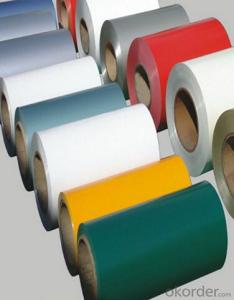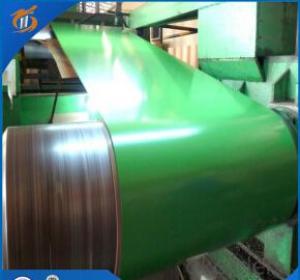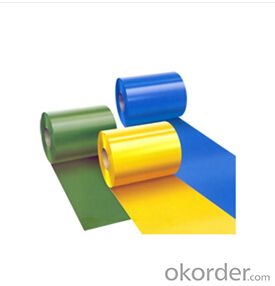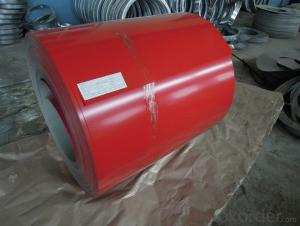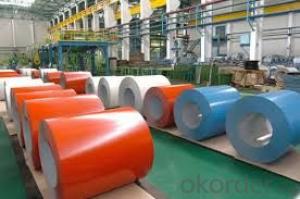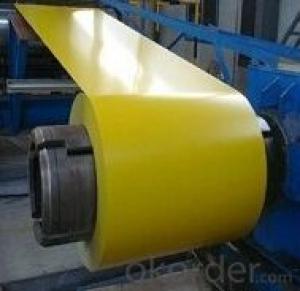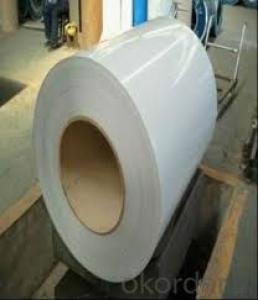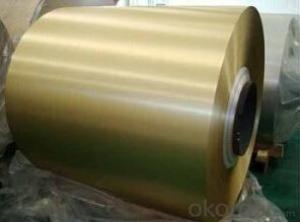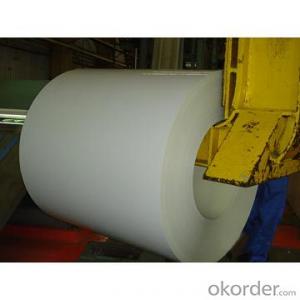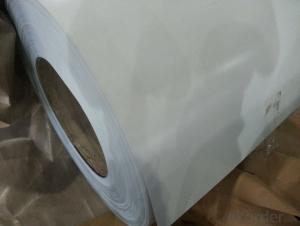PPGI Color Coated Steel Coil for Constructions
- Loading Port:
- Shanghai
- Payment Terms:
- TT OR LC
- Min Order Qty:
- 25 m.t.
- Supply Capability:
- 10000 m.t./month
OKorder Service Pledge
OKorder Financial Service
You Might Also Like
Basic Info.
Model NO.:JISG3312, SGCC
Surface Treatment:Galvanized
Certification:ISO, SGS
Technique:Cold Rolled
Standard:ASTM, JIS, AISI, DIN
Application:Container Plate
Edge:Slit edge
Stock:Stock
Steel Grade:Q235B
Thickness:0.12mm-3.0mm
Coil Weight:3-8 Tons
Gloss:65%-80%
Export Markets:Global
ID:508mm
Zinc Coating:50g-250g/Psm
Feedback:Within 24 Hours
Additional Info.
Packing:Export Standard Package or as Request
Standard:AISI, ASTM, BS, DIN, GB, JIS
HS Code:7210701000
Production Capacity:150, 000tons/Year
Product Description
Specifications:
1. Thickness: 0.12mm-1.3mm
2. Width: 600mm-1250mm
3. Length: According to client's demands
4. Top paint: 15 to 25 um (5 um + 12-20 um)
Back paint: 7 +/- 2 um
5. Gloss: Normal or High gloss
6. Zinc coating: Z50-Z275G/psm
7. Inside Diameter: 508mm/610mm
8. Outside Diameter: 1000mm-1500mm
9. Coil weight: 3-8 tons
10. Payment: T/T, L/C, D/P, Paypal, Western Union
11. Trade Term: FOB, CFR, CIF
12. MOQ: 25 Mt
13. Package: Export standard package or as request
14. Shipment: By container
15. Standard: AISI, ASTM, BS, DIN, GB, JIS
16. Grade: JIS G3322, CGLCC, ASTM A755, CS-B
Basic Information:
Product/Service (We Sell): steel sheet pile, steel rail, h-beam, rebar, steel pipe, steel strip, plate ,stainless steel and galvanized steel.
Number of Employees: about 100 People.
Trade & Market
Main Markets:
North America, Canada
Export Percentage: 65% - 81%
- Q: Is steel with a black coloring as strong as regular steel. if you are asking why i have two wordsBlack Katana.I know a katana is not made with normal steel, it is made of two types with varying grades of carbon to give it speacial properties, i just want to know if the black will make a difference.
- The term tensile potential refers back to the quantity of tensile (stretching) rigidity a textile can stand up to in the previous breaking or failing. the in simple terms suitable tensile potential of a textile is calculated by making use of dividing the element of the textile examined (the pass area) by making use of the strain located on the textile, regularly expressed in terms of pounds or much consistent with sq. inch of fabric. Tensile potential is an considerable degree of a textile's skill to accomplish in an utility, and the scale is extensively used whilst describing the residences of metals and alloys.
- Q: How are steel coils processed at the steel service centers?
- Steel coils are processed at steel service centers through a series of steps. First, the coils are unrolled and flattened using a decoiler and a leveling machine. Then, the steel is cut into the desired length and width using shears or slitting machines. Next, the coils may undergo various treatments such as pickling, galvanizing, or coating to enhance their corrosion resistance or appearance. Finally, the processed coils are inspected, packaged, and prepared for shipment to various industries for further manufacturing or construction purposes.
- Q: Who started or popularized the use of the steel guitar in country music? Early country songs contained no steel guitars but by 1950 the steel guitar had become a staple of country music.
- The Lap steel guitar evolved from the Hawaiian guitar. Then came the console steel guitar with muliple necks to which were added pedals (by the Gibson Guitar Corporation), the instrument being named the Electraharp. An early player of this instrument was Alvino Rey. Pioneers of the Pedal Steel were Adolph Ricken backer, Paul Bigsby and Leo Fender. Paul Bigsby began making Pedal Steel Guitars in 1948, and Speedy West used the second of these to be built, and used extensively in his work with Jimmy Bryant. The likes of Shot Jackson, Buddy Emmons, Ralph Mooney, Zane Beck and Jimmy Day mechanically enhanced the steel guitar, and gave us the machines which are found today.
- Q: What are the different types of steel coil recoiling methods?
- There are several different types of steel coil recoiling methods, including oscillating recoiling, flying shear recoiling, and rotary recoiling.
- Q: If I wear a pair of thick wool socks, is walking around in the snow with steel-toed boots going to be a problem? I'm wondering if the steel will make my toes too cold.
- Yes, steel-toe boots are cold, thick wool socks or not. Suggest using Cofra orange colored pull-on knee boots. Non-steel toe cap resistant to 200 joule (one and a half tons of crush protection), penetration resistance, cold insulation to minus 20, ankle protection, heat resistant outer sole 300 degrees for one minute, energy absorption of seat region, slip resistance, the biggest traction cletes I've ever seen and they look like big boots seen the acid trip pretending to be film titled: Yellow Submarine. Available: www fra.it
- Q: where can i get a thick sheet of steel ? and is steel bullet proff for example if you shoot a bullet on steel will that bullet bounce right off the steel ?
- Try the business-to-business yellow pages in your area. A local hardware store can also tell you who to contact. Or search steel plate or sheet metal on the internet to find a local supplier. No, sheet steel is not bullet proof, unless you get heavy plate. Depending on how thick it is, the plate will deform if hit by a high velocity bullet, but usually not enough to matter. Bullets have velocities from about 500 ft/sec up to roughly 3000 ft/sec, depending on the type of weapon used. I wouldn't try to use anything thinner than 3/4 inch. You'll have to experiment and see what it will actually stop. I can't guarantee it'll stop a high-velocity rifle slug. Try it and see.
- Q: What are the common defects in steel coil finishes?
- There are several common defects that can occur in steel coil finishes. These defects can impact the appearance and functionality of the steel and may need to be addressed before the coil can be used or sold. 1. Coil breaks: Coil breaks are a common defect where the steel strip breaks during winding or unwinding. This defect can result in a discontinuity in the surface of the coil and can lead to further damage if not addressed. 2. Edge wave: Edge wave refers to a distortion or waviness at the edges of the steel coil. This defect can occur during the rolling or cooling process and can affect the flatness and uniformity of the coil. 3. Corrosion: Corrosion can occur on the surface of steel coils if they are not properly protected or stored. This can lead to rust and degradation of the steel, impacting its strength and appearance. 4. Streaks and stains: Streaks and stains can occur on the surface of steel coils due to improper cleaning or contamination during the production process. These defects can affect the aesthetic appearance of the steel and may need to be addressed before the coil can be used. 5. Scratches and dents: Scratches and dents can occur on the surface of steel coils during handling, transportation, or storage. These defects can impact the flatness and surface quality of the steel and may require repairs or adjustments. 6. Coating defects: If the steel coil has a coating or paint applied to it, several defects can occur. These include blistering, peeling, or uneven application of the coating, which can affect the durability and appearance of the steel. It is important to note that these defects can vary in severity and may require different methods of repair or mitigation. Regular inspections and quality control measures can help identify and address these defects before they become more significant issues.
- Q: How are steel coils used in the manufacturing of automotive suspension systems?
- Steel coils are used in the manufacturing of automotive suspension systems as they provide the necessary support and flexibility to absorb shocks and vibrations. These coils are typically placed between the vehicle's frame and the axle, allowing the suspension to compress and rebound when encountering bumps or uneven terrain. By absorbing and distributing the impact forces, steel coils ensure a smoother and more comfortable ride for the passengers while also enhancing the vehicle's stability and handling capabilities.
- Q: How do steel coil manufacturers minimize waste and maximize efficiency?
- Steel coil manufacturers minimize waste and maximize efficiency by implementing various strategies such as optimizing production processes, recycling and reusing scrap materials, adopting advanced technologies for energy conservation, and implementing lean manufacturing principles to eliminate unnecessary steps and reduce downtime. They also focus on continuous improvement, employee training, and regular maintenance of equipment to ensure smooth operations and minimize waste generation.
- Q: What are the common coil coating materials?
- The common coil coating materials include polyester, polyurethane, polyvinylidene fluoride (PVDF), silicone polyester, and epoxy.
Send your message to us
PPGI Color Coated Steel Coil for Constructions
- Loading Port:
- Shanghai
- Payment Terms:
- TT OR LC
- Min Order Qty:
- 25 m.t.
- Supply Capability:
- 10000 m.t./month
OKorder Service Pledge
OKorder Financial Service
Similar products
Hot products
Hot Searches
Related keywords
